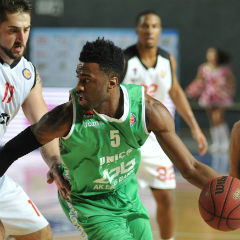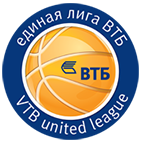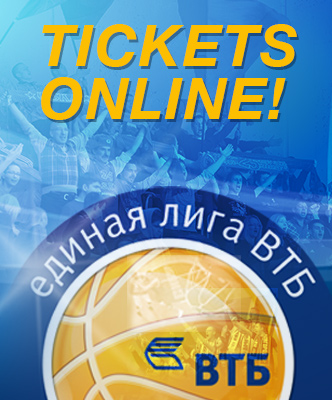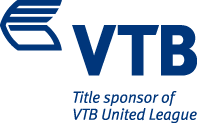04december
Keith Langford:
I Love Taking Charge

November MVP and UNICS guard Keith Langford spoke with VTB-League.com and Sport-Express.
Reigning champs CSKA recently took over 1st place in the standings, knocking off previously undefeated Zenit on November 29. The Red-Blues also took care of business against a surging UNICS team by neutralizing the league's top scorer Keith Langford. But none of Kazan's other November opponents--Bisons, Vita, Khimki and Nizhny Novgorod--had the same success.
Evgeny Pashutin's men posted a 4-1 record last month, led by 32-year-old guard Keith Langford, who averaged 26.8 points in Kazan's four wins. His most memorable performance came against Khimki, when he scored 14 points in the decisive 4th quarter. During November, UNICS improved from 6th to 3rd in the standings. Langford doesn't deny his role in the team's success, but emphasizes that better communication on the court has been the biggest factor:
- UNICS made the right adjustments from the loss to CSKA, - says Langford. - After we got embarrassed in Moscow, we held a team meeting and cleared the air with each other. I think that helped everyone out. I just do what I know how to do. I love to take charge and I'm happy that I've been able to reward my coaches and teammates for their trust.
- In other words, UNICS was lacking team chemistry to start the season?
- Not entirely. The team came together right away. We all get along and, overall, there's a positive atmosphere in the locker room. It wasn't so much a problem with chemistry. At the same time, we had trouble sometimes communicating on the court, which led to lots of mistakes on defense.
- Do you think you may have gelled more quickly if Evgeny Pashutin had been with the team for the entire preseason (Pashutin coached the Russian national team at EuroBasket)?
- It's not just Pashutin. Kostas Kaimakoglou and Arturas Milaknis arrived even later because of EuroBasket. In any case, it's not so much about the coach, but rather the execution on the court. To me, it didn't seem like everyone understood their role on the team. But after our meeting, guys accepted their roles and we became more effective as a squad.
- You were under a lot of pressure in November. If a game was close, Kazan's offense ran almost exclusively through you. Physically, that can't be easy. What was it like for you from a mental standpoint?
- It really was tough physically. After all, our opponents usually have an entire strategy prepared and might throw five different guys at me during a game. As a result, they stay fresh and play with a ton of energy. That's why it's really important to conserve your strength. From a psychological standpoint, I love it. I work hard at practice for moments like those, when the team is struggling and your teammates can count on you to deliver.
At the same time, there's more to it than taking the shot. You also need to be able to deal with the consequences. If you make the shot, that's great. But if you miss, you'll get a lot of criticism and people will question you. That's when it's important to stay confident, keep your head down and work hard for the next opportunity to make an impact. It's easier for me now since I don't read the Russian press at all (smiles).
- After the win over Khimki, you responded on Twitter to something Rimas Kurtinaitis said in his press conference. So, you must read the news a little?
- Here's what happened. At our next practice, all the guys started congratulating on playing my best game in 10 years. I was confused, but it turns out that's what Kurtinaitis said about my game. No, of course, I understand. He needed to explain his team's loss somehow, but that was going too far (laughs). I had to say something.
- How would you describe team president Evgeny Bogachev? In the basketball world, he's known for being very outspoken.
- I like him for being so direct. In America, we'd say he "shoots from the hip." Bogachev will always tell you what's on his mind. You can also tell right away that he's smart. For example, when he's upset with you, he can be very critical. But he always ends the conversation on a positive note. In other words, he knows how to keep a balance and properly motivate people.
- This is your 2nd year playing for Pashutin. How do the two of you get along?
- We were on the same page from the very first day. Pashutin arrived at UNICS with a good reputation. He'd won the Eurocup twice and led CSKA to the Final Four. Of course, the players knew that. He's also a former point guard, so he understands how to communicate with the team. I like working with him.
- Some people say that he's too reliant on his foreign players and doesn't trust the Russians on the team. Would you say that's true?
- I don't think that Pashutin cares one way or the other. Regardless, I don't see anything strange about it. In my opinion, the reasons are simple. If a team signs a foreign player, it most likely means that they couldn't find a local player of that ability. Plus, the salaries for foreign players are higher, which also raises the level of responsibility. The coaches probably feel that. You could say the same about other coaches. As for our coach, his teams have won titles by relying on foreign players. That means his system worked. Why change it? If you were in his place at CSKA, for example, would you keep Holden and Langdon on the bench? For some reason, I don't think so.
- At the end of last season, Pashutin gave an interview where he blamed Sergey Bykov for creating a divide in the locker room between the Russians and foreign players. Bykov refuted the accusation, saying that he tried to bring his teammates together and organized team outings in the city. Where's the truth?
- It's hard for me to comment on stuff like that. 70-80% of what's said in Russian locker rooms is in Russian. So, if Bykov did set anyone against the foreign players, I wouldn't know about it. There's just one thing I can say. At first, Bykov seemed reserved and kind of moody and we didn't talk much. But once, during the second half of the season, the two of us were alone in the locker room after a game. The team was going through a tough time and we talked for about an hour about how to fix the situation. It was a really honest conversation. After that, my perception of Bykov completely changed. I could tell how much he wanted to help the team.
- You played for Maccabi during the 2011-12 season. You didn't get off to a great start, but by spring you were the team leader. What were you thinking at first when you had to watch close games from the bench?
- Jordan Farmar was playing at my position then. He came over during the NBA lockout. At first, David Blatt trusted him down the stretch. I didn't worry about it. I saw what Jordan was doing and thought to myself: "I could do at least as well."
- Does it bother you when someone else gets to take a big shot?
- I'm not jealous at all, if that's what you're hinting at. I won't deny that I'd shoot the ball 99% of the time in big moments if it was up to me. But I understand that it's not always to the team's advantage. Of course, I'm never going to pass up an opportunity to attack. But I don't have to have the ball if a teammate has a good look and feels confident. Or, if I've got the ball and I see an open teammate, I kick the ball out to them. During that early stretch at Maccabi, I was hardly on the court in big moments...But I survived. I love to make the big plays, but the team's success is always my first priority.
- Did you enjoy playing for Blatt?
- David is a phenomenal coach. He's a gifted psychologist and very quickly knows how to relate to every player. And he doesn't just know how to get you to play well. He understands you deeper than that. Looking back, I'm amazed at how well he understood my situation when I came to Maccabi. If he had thrown me in right away and not done it gradually, it's possible I would have burned out.
- You also got to work with another legendary coach, Gregg Popovich. Do they have anything in common?
- First of all, they both love to be ironic. They like to tease you, but at the same time they're telling the truth. And both of them are great communicators. Popovich, like Blatt, understands people extremely well. When I was at San Antonio, I wasn't just the last guy on the bench...sometimes I didn't even make the roster. But, at the same time, I had the feeling that Popovich knew everything about me. At the least, everything he needed to know so that I would be feel as comfortable as possible on the team.
- Before moving to Europe, you spent time in America's minor leagues. What do you remember about that time in your life?
- With time, I've started to look at it as part of the process that got me to where I am now. If not for those experiences, I may never have won the Alphonso Ford trophy (Langford was the Euroleague's top scorer during the 2013-14 season). In addition, those memories help me appreciate more what I have now. I didn't just play in the D-League. I was also in the now-defunct USBL, where I got paid just $6000 for two months. That was true basketball purgatory.
- Is it true that you got offers from Europe after not being selected in the 2005 NBA Draft?
- Yes, there were some decent options. But I didn't understand that at the time. I was ignorant back then and didn't know anything about basketball outside of the USA. I graduated from college as one of the top scorers in NCAA history. I thought Europe would be a step backwards. And that if I didn't make the NBA, I was a failure. That's why I wanted to stay in the USA and believed that I'd get a chance sooner or later.
- Have you stopped dreaming about the NBA? There are always rumors on the internet about NBA interest.
- At a certain point, I stopped thinking about it. You can't imagine how much of a relief that was. When I scored 25 points, I didn't have to wonder anymore if an NBA scout was in the stands. Now I can simply enjoy the present and live without those distractions, which also prevent me from focusing on my current goals.
I'm just a regular NBA fan. I bought League Pass and enjoy watching the games like a fan. For example, I love how James Harden plays and sometimes pay attention to the moves I'd like to steal (smiles).
- You played for Khimki from 2009-2011. What do you remember from that time?
- I often tell my friends about my first trip to Russia as a Khimki player. I made the decision to sign the contract with my agent in America. He made it sound like Khimki was practically Moscow. I was imagining that I'd spend the next two years surrounded by skyscrapers, avenues and the bright lights. When I arrived, I was met by two surly men...I couldn't even tell if they were speaking English. We got in a car and all I could see out of the window were trees and factories. I thought to myself: "What have you done?" (laughs). It's good that my first impression turned out to be very deceptive.
- Do you miss those days?
- I miss my youth (smiles). When I think about my years at Khimki, the first thing I think of are the missed opportunities. Now I understand that we had a chance to be a special team, but couldn't take advantage.
- A few years ago, you were close to getting Turkish citizenship. Why did you decide not to do it in the end?
- Everything was great at first. The Turks made me an offer to join their national team. We'd more or less decided on everything, but at the last moment they added new conditions, which I couldn't agree to.
In the end, I'm happy that it fell through. This summer, I got to play at the Pan-American games. Obviously, people joked that we were just a parody of the regular American team. But putting on a USA jersey was an unforgettable experience for me. Like I said before, I want to experience everything I can in basketball. I'm really happy that I had that opportunity.
- Your family lives in Austin. Did you ever think about moving them to Russia?
- They visit me a lot and will stay for a couple weeks. But I'm more comfortable living alone. It's easier for me to focus on basketball. Of course, I want to be close to my family. But, at the same time, I know very well that I don't have much more time to play and I'm trying to get as much from basketball as I can right now. Focusing on my work is easier when I'm alone. With my family, I'm always tempted to relax. That's why I'm very grateful to my relatives for allowing me to focus on what I love.
Sport-Express












































